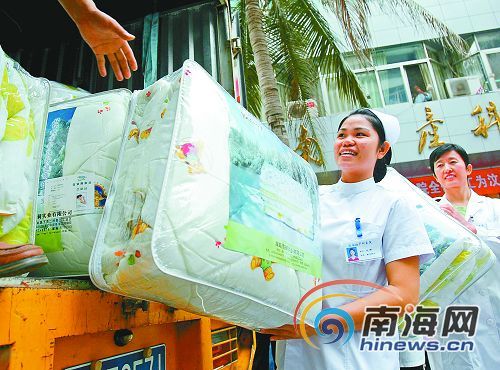Freezing weather would hit parts of earthquake-stricken areas in southwest China's Sichuan Province this winter, a high-ranking local official warned Friday, calling for more quilt donations to residents there.
 |
|
On November 20, 2008, medical workers of the Hainan Provincial Hospital for Gynecology and Obstetrics donate 100 new quilts to the earthquake-hit areas in Wenchuan, southwest China's Sichuan Province.
|
Sichuan has seen more rainy and cold days this winter than past years and the temperature was 0.5 to 1 degree Celsius lower than usual, executive vice provincial governor Wei Hong told a press conference in Beijing, citing meteorological forecasts.
Residents living in quake-affected and remote mountainous areas need 3.6 million quilts and 3.6 million cotton-padded clothes, he said.
"Some elderly people and children are in need of basic equipment to keep them warm. Residents in some quake-stricken areas even face the tough issue of provisions for this winter and the coming spring," he said.
So far, the province has received 3.274 million quilts, 3.658 million cotton clothes and 300,000 electric blankets and heaters, including donations from across the country and purchases by the provincial government, he said.
Some 6,489 families, mostly in the two worst-stricken counties of Beichuan and An'xian, are still living in tents because it was difficult to select sites for rebuilding houses, Wei said.
"Local authorities are busy making prefab homes to enable those residents to move in by the end of this month," he said.
As of Nov. 12, the province had rebuilt houses for 195,000 rural families, or about 15.5 percent of the reconstruction plan, and another 685,000 homes are under reconstruction in the countryside, he added.
According to Chen Kefu, deputy director of the Sichuan Provincial Civil Affairs Department, the province sill needs 330,000 quilts and more electric blankets and heaters.
"We aim to send those quilts, clothes and electric blankets and heaters to the hands of the affected people by the end of this month," he told reporters in Beijing.
Last week, meteorologists in Sichuan warned that the worst quake-stricken areas would experience four temperature drops ranging between four and seven degrees this winter.
"The big drops of temperature will lead to a deep freeze. If the temperature drops were accompanied by rain and snow, then transport would be disrupted," said Ma Zhenfeng, director of the Climate Center of the Sichuan Provincial Meteorological Bureau.
Statistics show the worst quake-stricken areas, mostly in high mountains, report an average temperature of 7 to minus 3 degrees in winter. The lowest was recorded in Songpan County, or minus 2.8 degrees.
The 8.0-magnitude quake centered in Sichuan's Wenchuan County left more than 69,000 people dead, 374,000 injured, 18,000 missing and millions homeless.
More than 31,000 aftershocks have been reported since, with the strongest measuring 6.4 on the Richter scale.
In terms of the intensity and scope of destruction, the May 12 quake is believed to have surpassed the 7.8-magnitude quake in 1976 in Tangshan, northern Hebei Province, which claimed more than 240,000 lives.